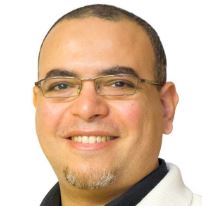National Postdoc Appreciation Week: Mohamed Saad, PhD
By Monelli Esfandiary '25
 We are thrilled to highlight College of Health Postdoc Mohamed Saad, for National Postdoc Appreciation Week! Dr. Saad works alongside Bilal Khan, PhD. He tells us, “As part of my Ph.D, I developed simulation/optimization software, which can find optimal schedules for nursing staff in ICUs, and effective strategies to prevent the spread of Hepatitis C and HIV among people who share injection drugs. After my Ph.D. I worked in the industry for several years, developing IT solutions for logistics planning in domains ranging from supermarket chains to hospitals.”
We are thrilled to highlight College of Health Postdoc Mohamed Saad, for National Postdoc Appreciation Week! Dr. Saad works alongside Bilal Khan, PhD. He tells us, “As part of my Ph.D, I developed simulation/optimization software, which can find optimal schedules for nursing staff in ICUs, and effective strategies to prevent the spread of Hepatitis C and HIV among people who share injection drugs. After my Ph.D. I worked in the industry for several years, developing IT solutions for logistics planning in domains ranging from supermarket chains to hospitals.”
In 2022, Dr. Saad’s journey led him to Lehigh University, where he pursued his postdoctoral work with Dr. Khan. He notes, “I was interested in bringing my experiences to bear on academic R&D, and contributing to the development of AI solutions related to population health.”
During his time at Lehigh, Dr. Saad worked on two major projects with Dr. Khan. Their first project, “Internet of Behaviors" (IoB), focused on adapting various existing AI approaches to analyze temporal health data, in order to predict forecasts and test scientific hypotheses. They worked with a magnitude of datasets such as: sensors, interviews, historical time series, and even people’s attitudes and behaviors collected using their own in-house smartphone app called ODIN. They then used mathematical modeling to forecast future events. Saad says, “If successful, the IoB could be useful down the road for a number of health-related projects, including one on alcohol use among students at Lehigh, and another on substance use among homeless youth. For example, if we could forecast whether a person was likely to drink in the near future, we could generate a “just in time intervention” message so they would be less likely to relapse. This would help improve health outcomes.”
For his second project, Dr. Saad worked with Lehigh’s College of Health and College of Business in the development of a high-security on-premise Health Data Warehouse (HDW). He says, “The on-prem facility is up and running and located in room 160 of the Health, Science, and Technology building. It is physically secured and totally disconnected from the Internet.”
From this, he shared, “Lehigh researchers can request a dedicated virtual machine in this facility for one of their projects, and they control who has access to the virtual machine and its encrypted storage. In addition to creating the technologies and processes to achieve this, and housing several highly restricted data sets, I also brought ~3000 freely available public health-related data sets into the HDW, for use by affiliated researchers and their students. This makes the HDW a great resource for CoH/CoB faculty, and I hope it will lead to new partnerships with industry, government, nonprofits, and peer academic institutions.”